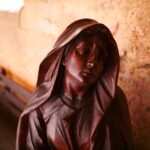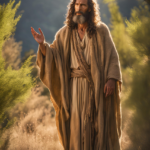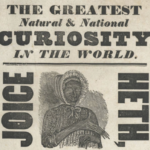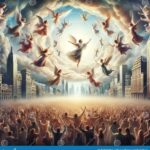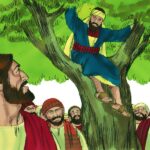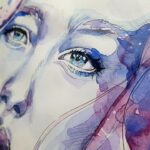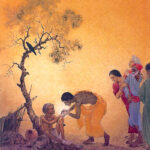Acts 16:9 – 15
“Now a word came stealing to me, my ear received the whisper of it.
Amid thoughts from visions of the night,
when deep sleep falls on mortals,
dread came upon me and trembling,
which made all my bones shake. (Job 4:12 – 14)
Oh my Lord! Give us a vision like that. Put the fear of you in our hearts. Make us tremble and make all our bones shake. How’s that for the start of the sermon?
Our nation needs a vision for the future – a vision of biblical length. Our faith has been formed from visions, but the practice has receded among us, hasn’t it? We are not big on visions these days. We have psychotherapists, life coaches, and analysts for our dreams and visions. The movies “Good Will Hunting” and “Analyze This.” The television comedy series, “Shrinking” – these are examples of how we now relate to our dreams.
Mostly the idea of God speaking out loud to us or speaking to us in dreams has disappeared. In the novel Revelation, a sophisticated university town pastor hears the actual voice of God. When he tells his congregation, they all think he needs therapy.
Barbara Brown Taylor, in her Lyman Beecher Lectures references Hebrew scholar Richard Elliott Friedman‘s book The Disappearance of God, in which he chronicles divine recession in the Hebrew Bible. Working his way from Genesis to the minor prophets, he paints a portrait of God that fades as he goes. Divine features that were distinct at the beginning of the story grow blurry as God withdraws, stepping back from human beings so that they have room to step forward.Taylor, Barbara Brown. When God is Silent (Lyman Beecher Lectures on Preaching Book 1997) (p. 53). Cowley Publications. Kindle Edition.
But the Bible is a book of visions and dreams. Our faith ran on visions for long centuries. Recall Abram’s vision of a child of promise even though old man Abraham was as good as dead. Remember Moses’ vision of leading Israel out of slavery to the Promised Land. There’s Joshua’s vision of fighting the battle of Jericho and all the walls falling down. And Isaiah’s vision of the Lord. And Ezekiel’s vision of the valley of dry bones coming alive. If you want to, you can read that story in Ezekiel 37
“Dem bones, dem bones, dem dancing bones.
Dem bones, dem bones, dem dancing bones.
Dem bones, dem bones, dem dancing bones.
Doin’ the skeleton dance.
The foot bone’s connected to the leg bone.
The leg bone’s connected to the knee bone.
The knee bone’s connected to the thigh bone.
Doin’ the skeleton dance.
Let’s see if we can find a vision for our nation. I’m not sure what has happened to America. We have lost our vision of democracy. 49% of Americans believe democracy will not last another dozen years. Faith in democracy is shaken in America and across the globe. American historians tell us the current moment is the one of the most perilous threats to democracy in our history. Historian David Blights says, “American democracy is in peril and nearly everyone paying attention is trying to find the best way to say so.” Blight dares suggest the unthinkable, “Otherwise it may be 1861 again in some very new form.”
This is the problem we face – we have vision difficulties. America’s vision is no longer 20/20. America has cataracts. Rhetorical scholars Michelle Holling and Dreama Moon: America holds the potential for a national vision premised on rights, freedoms, and democratic participation as hinted at in its founding documents. However, given that such an America was founded on imperialism and colonialism with their attendants of oppression and exploitation, its twin, Amerikkka surfaces. Spelling Amerikkka as such is to highlight an ideology of white supremacy (not a particular embodiment as in the KKK). In the months leading up to and following the presidential election, a tale of two Americas/Amerikkkas was reaffirmed and displayed for the nation and world to witness. The two Americas points to the nation’s vision as distorted by cataracts (a clouding of the eye’s lens) that decrease its visual acuity and reconciliation with its past, hampering advancement of a national vision. Clouding both America/Amerikkka’s vision is white supremacy, wherein the latter (Amerikkka) is implicated in the former (America).
America needs “I” surgery. When our leaders are ego-maniacs, we need a new vision.
I don’t want to talk about Critical Race Theory, or “wokeness” or political correctness or abortion or all the gobbledly gook of globalism . I want to talk about our nation’. We are off chasing rabbits – fads, conspiracies, politics, and an assortment of Americanized idols.
In the KJV, Proverbs 29:18 reads, “Where there is no vision, the people perish.” No vision? Sign the death certificate.
No group has ever suffered more in America than African American slaves. How did they survive? They were a people of vision looking across Jordan to see a band of angels coming after them. They gathered in secret meeting places. They called them hush harbors. My vision for the church is for us to be a Hush Harbor Church – a sacred place where we can speak out against the power of a culture determined to destroy us.
African American slaves utilized camouflaged locations, hidden sites, and enclosed places as freedom cells where they could come in from the wilderness, untie their tongues, speak the unspoken, and sing their own songs to their own selves in their own communities. Hush harbors have evolved into all kinds of holy spaces – woods, plantation borders, churches, burial societies, beauty shops, barbershops, and kitchens. And taverns and bars and honky tonks all have served as hush harbors – spaces to let go and spaces to resist the culture. I offer you the church as a hush harbor where we can come in from the secular powers and principalities and begin to dream of an alternative world – a kingdom of God ruled by Jesus our Lord.
The hush harbor gave birth to the vision of slaves of that time when God would hear the cry of the oppressed and set the people free. Our church can serve as a hush harbor where we can critique our culture and its alien power over so many millions of our fellow citizens, where we can confess our own complicity in secular ways, where we can destroy American idols and refuse to give in to greed. Here we can challenge and negotiate our various contested ideas. Here we can work out our troubles and disagreements together.
The American dream has become the American nightmare. Instead of “morning in America,” we have “midnight in America.” We need a national vision of a hush harbor church where we may be able to hatch Christian rebellions to the encroaching secular culture. Somehow, we must recover the backbone to resist the culture. And good news: We can. It is possible for young women and men to see visions. It is possible for old men and old women to dream dreams. It is possible for a valley of dead bones to live again. It is possible.
The living God, the God of the living not of the dead, is alive in our ancestors who surround us. The communion of the saints we call it. It is possible to hear your grandmother’s voice. It is possible to hear voices who are trying to guide you. It is possible to have dreams of your father or your mother to help you. Don’t discount the power of the living God to move across what we call time. During slavery, African Americans were buried faced toward the ocean, “with a view over the sound, since it was believed that their spirits would return to Africa if buried near the water.”
Before you leap to call this superstition, please remember that Joseph left instructions for the Israelites to dig up his bones down in Egypt and take them to the Promised Land. “When God comes to you, you shall carry up my bones from here.” Joseph wanted his bones to testify that he didn’t belong to Egypt. He belonged to the people of God. Even in dying, we are testifying to our faith. There are always ways to resist the power of the secular culture.
America needs to get her dream back. Instead of fuming over whether America was founded as a Christian nation, how about living as Christians in our secular nation? Help us dream again Lord!
In Paul’s dream, a man of Macedonia pleaded with him: “Come over to Macedonia and help us.”
How many of us have a vision of a man of America pleading: “Come to America and help us.” America – desperate for help. America enslaved to the god of Mammon. America – angry, resentful, vengeful. America – lost in an unmitigated grasp for secular, political power. America needs help. America dreams of riches untold that never materialize.
I saying that we can be fooled by fool’s gold, fake promises, and riches that never materialize. The working men and women of America feed the goose that lays the golden eggs, we house the goose, we provide the goose with the best health care, we take care of the goose, but we never, never get a single golden egg.
Can America dream God-filled dreams again? Can we see visions of being called into service rather than lording it over others?
I want us to have Paul’s dream. I want us to have a vision that we are being called to do something about our nation’s illness. Look at Paul go. At the crack of dawn, he is up and headed to Macedonia. One thing about Paul: he was the most intense person in the church. We may never meet anybody who takes Jesus as seriously. Paul believed that the ideal Christian life would be to be like Jesus: to love, to care, to give, to serve, to suffer, and to sacrifice like he did.” And every morning of his life, Paul said, “today I will press on toward the goal.”
Focusing on Jesus prepared Paul for the vision of the man from Macedonia. Flannery O’Connor has an essay that begins, “I am no vague believer.” Paul could have written those words. He was hard into Christian faith. I am not offended when you think that my theology is too liberal, but you need to know that “I’m no vague believer.” I came by my convictions the old-fashioned way – in a life-and-death struggle to know. I am hard into Christian faith.
Come back for a moment to the text: “On the Sabbath day we went outside the gate by the river, where we supposed there was a place of prayer.” We only know as we go. We supposed; we didn’t know. Do you get it?
Guess what? There was a place of prayer and a group of women were at the river praying. A woman named Lydia, a dealer in purple cloth, a worshiper of God, opened her heart to listen eagerly to what was said by Paul. This is a preachers’ dream: listeners eager to hear the gospel. “When she and her household were baptized,” she prevailed upon Paul and his friends to stay with her.
Lydia was the first convert in Europe. Later the Europeans brought the gospel to America and today we worship God all because a man of God had a dream and saw a man from Macedonia asking for help.
That’s why vision still matters in the church. Our vision today will impact the Christians that worship here a thousand or two thousand years from now. Do we have a vision large enough for two millennia? I’m a Christian and that’s what I’m working on today. That’s the sermon and I’m out of here. Amen!



